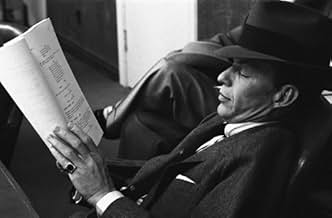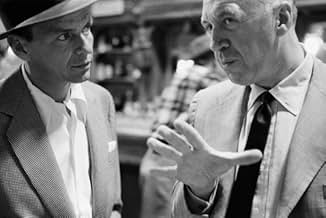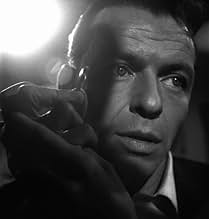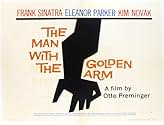IMDb RATING
7.3/10
13K
YOUR RATING
A junkie must face his true self to kick his drug addiction.A junkie must face his true self to kick his drug addiction.A junkie must face his true self to kick his drug addiction.
- Nominated for 3 Oscars
- 3 wins & 8 nominations total
Jered Barclay
- Junkie in Lock-Up
- (uncredited)
Leonard Bremen
- Cabbie in Lock-Up
- (uncredited)
Paul E. Burns
- Suspenders in Lock-Up
- (uncredited)
Pete Candoli
- Jazz Musician
- (uncredited)
Herschel Graham
- Club Safari Patron
- (uncredited)
Harold 'Tommy' Hart
- Officer Kvorka
- (uncredited)
Featured reviews
I've always enjoyed Frank Sinatra's music, and just recently I wrote a term paper about his life story. I've been fascinated by the life and legend of Ol' Blue Eyes. However, I've never seen any of his movies. So I wanted to see if his acting was as great as his singing. Well...it was! I was blown away by his performance in this movie! He really does a tremendous job as recovering heroin addict Frankie Machine, who's trying to put his life back together and audition as a drummer for a local band.
Otto Preminger's direction is great as well. I haven't seen any of his other movies. I read his biography on the IMDB. He seems like one of those directors who was sorely misunderstood, and people had conflicted thoughts about him. Seems like the kind of person who appeals most to cult enthusiasts. I haven't seen enough of his films to know for sure if he's really brilliant, but now I'm curious. I want to see more of his films, because judging by his attempt with "The Man with the Golden Arm" this guy has talent. I also loved the music for this movie. The score definitely contains the kind of music that I'll remember if I ever happen to hear it again. That's when you know you have a great score.
The supporting performances are fine as well, including Darren McGavin as the local drug pusher, Eleanor Parker as Frankie's wheelchair-bound wife and Kim Novak as his lover.
It's interesting to see how filmmakers handled the subject of drug abuse, as opposed to modern attempts in films like "Trainspotting" and "Requiem for a Dream." Back in 1955, just mentioning the word "drugs" caused controversy, and if you watch the film they kept the subject on a very discreet level. There's only one scene where Frankie is actually getting heroin injected into his arm, and they showed a close-up of the reaction of his face rather than showing the needle graphically poking into his veins. But it delivered its message without making it feel watered-down. In a powerful drama like this, with powerful performances and direction like this, you don't need graphic portrayals of drug abuse to keep the audience intrigued.
"The Man with the Golden Arm" is a dramatic gem that all film buffs should check out. It really is an amazing piece of work!
My score: 8 (out of 10)
Otto Preminger's direction is great as well. I haven't seen any of his other movies. I read his biography on the IMDB. He seems like one of those directors who was sorely misunderstood, and people had conflicted thoughts about him. Seems like the kind of person who appeals most to cult enthusiasts. I haven't seen enough of his films to know for sure if he's really brilliant, but now I'm curious. I want to see more of his films, because judging by his attempt with "The Man with the Golden Arm" this guy has talent. I also loved the music for this movie. The score definitely contains the kind of music that I'll remember if I ever happen to hear it again. That's when you know you have a great score.
The supporting performances are fine as well, including Darren McGavin as the local drug pusher, Eleanor Parker as Frankie's wheelchair-bound wife and Kim Novak as his lover.
It's interesting to see how filmmakers handled the subject of drug abuse, as opposed to modern attempts in films like "Trainspotting" and "Requiem for a Dream." Back in 1955, just mentioning the word "drugs" caused controversy, and if you watch the film they kept the subject on a very discreet level. There's only one scene where Frankie is actually getting heroin injected into his arm, and they showed a close-up of the reaction of his face rather than showing the needle graphically poking into his veins. But it delivered its message without making it feel watered-down. In a powerful drama like this, with powerful performances and direction like this, you don't need graphic portrayals of drug abuse to keep the audience intrigued.
"The Man with the Golden Arm" is a dramatic gem that all film buffs should check out. It really is an amazing piece of work!
My score: 8 (out of 10)
Heroin, repression, lies, lust, claustrophobia and jazz: long before "Trainspotting," this was how you made an expressionistic film about drug addiction. Still stylishly evocative, thanks to Preminger's direction and Bernstein's pounding score, the adaptation of Nelson Algren's novel stands out for its grotesques, not least of which is its title character -- Preminger's narrative pacing never flags, but he somehow manages to linger on a number of minor characters whose weird, ruined lives cling to a patchwork dignity, and the effect is pitched somewhere between the social justice aims of "On the Waterfront" and the voyeurism of "Touch of Evil." Sinatra's performance, sweaty with vulnerability, is among his best. The supporting cast is also extremely good, but it's the urgent soundtrack and anxious camera, constantly tracking over a Caligari-skewed slice of the bowery that remain in memory.
Sinatra is thoroughly convincing as the addict in this grim horror story of what life is like for someone who has lost his soul to drugs. This is film noir made even more noir by the drab sets and lighting. We go through the terrifying experience of a man who is trying to escape from the monster he has placed on his own back.
Elmer Bernstein's score is a mixture of jazz and symphony that makes the addict's frightful journey even more believable to the audience.
This film opened the topic of drug addiction the way LOST WEEKEND broached the subject of alcoholism. At least people could talk about these addictions a little more freely.
Elmer Bernstein's score is a mixture of jazz and symphony that makes the addict's frightful journey even more believable to the audience.
This film opened the topic of drug addiction the way LOST WEEKEND broached the subject of alcoholism. At least people could talk about these addictions a little more freely.
A strung-out junkie (Frank Sinatra) deals with daily demoralizing drug addiction while crippled wife (Eleanor Parker) and card sharks continue to pull him down.
While this is not the first film to deal with drugs, it is probably the first to deal with them in a very serious manner. "Reefer Madness" and "Cocaine Fiends", for example, can be written off as humorous nostalgia. This film, on the other hand, is decades ahead of "Trainspotting" and "Requiem For a Dream". (Did you even know heroin addiction was prominent in the 1950s?)
Variety called the film "a gripping, fascinating film, expertly produced and directed and performed with marked conviction by Frank Sinatra as the drug slave." I agree for the most part, though I really did not enjoy Sinatra's acting as much as many others did, I think. Otto Preminger is a first-rate director, and I hope this film gets the respect it deserves over the long run (I found the 50th anniversary release to be not nearly cleaned up enough).
While the focus is heroin and addiction, one could also make a case about this film being about love. Frankie's wife brings him down, encourages him to go back to his old habits, turns him away from his dreams. Molly (Kim Novak) does just the opposite. Divorce and adultery are hardly ever positive topics, but in this film you almost hope that Frankie goes that route.
While this is not the first film to deal with drugs, it is probably the first to deal with them in a very serious manner. "Reefer Madness" and "Cocaine Fiends", for example, can be written off as humorous nostalgia. This film, on the other hand, is decades ahead of "Trainspotting" and "Requiem For a Dream". (Did you even know heroin addiction was prominent in the 1950s?)
Variety called the film "a gripping, fascinating film, expertly produced and directed and performed with marked conviction by Frank Sinatra as the drug slave." I agree for the most part, though I really did not enjoy Sinatra's acting as much as many others did, I think. Otto Preminger is a first-rate director, and I hope this film gets the respect it deserves over the long run (I found the 50th anniversary release to be not nearly cleaned up enough).
While the focus is heroin and addiction, one could also make a case about this film being about love. Frankie's wife brings him down, encourages him to go back to his old habits, turns him away from his dreams. Molly (Kim Novak) does just the opposite. Divorce and adultery are hardly ever positive topics, but in this film you almost hope that Frankie goes that route.
I loved that this movie takes place on an imaginary block of an imaginary city. You could say the streets represents a state of mind just like the title of
Chinatown did two decades later. Here degeneracy and addiction are the
norm. This place sucks you in and wont let go. It's here that Sinatra must face his demons when he returns home after getting clean at a rehab clinic. The film ends up being just as much about moving on from the past as it does about drug addiction.
Sinatra's junky is a bit amorphous, we never really learn whether he grew up here or what led him to his addictions. However, the story is strong and told with a nice brisk pace. There are some real memorable moments (the Gambling
sequence, Frankie coming off smack, etc). Preminger's direction is great, some subtle camera work adds a lot to a number of scenes. Elmer Berstein's score
and Saul Bass' titles perfectly set the mood. Overall, an endearing film you should check out.
Chinatown did two decades later. Here degeneracy and addiction are the
norm. This place sucks you in and wont let go. It's here that Sinatra must face his demons when he returns home after getting clean at a rehab clinic. The film ends up being just as much about moving on from the past as it does about drug addiction.
Sinatra's junky is a bit amorphous, we never really learn whether he grew up here or what led him to his addictions. However, the story is strong and told with a nice brisk pace. There are some real memorable moments (the Gambling
sequence, Frankie coming off smack, etc). Preminger's direction is great, some subtle camera work adds a lot to a number of scenes. Elmer Berstein's score
and Saul Bass' titles perfectly set the mood. Overall, an endearing film you should check out.
Did you know
- TriviaFrank Sinatra jumped at a chance to star in the film before reading the entire script.
- GoofsIn a scene about twenty minutes in, as the camera exits the bar following Frankie, the jukebox can be seen to slide out of the way of the camera at the bottom of the screen.
- ConnectionsEdited into Bass on Titles (1982)
- How long is The Man with the Golden Arm?Powered by Alexa
Details
Box office
- Budget
- $1,000,000 (estimated)
- Gross worldwide
- $4,652
- Runtime
- 1h 59m(119 min)
- Color
- Aspect ratio
- 1.85 : 1
Contribute to this page
Suggest an edit or add missing content
























